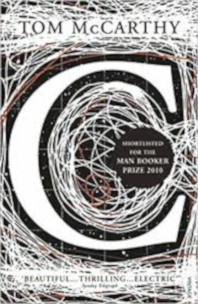C
Tom McCarthy
C is the story of Serge Carrefax, a young man who sees the world uniquely and lives a short life unlike any other. Born at the dawn of the twentieth century, Serge is quickly steeped in the weird emergent technologies and seductive new machinery of the day – radio, the speed of cars, of aeroplanes.
However, when personal tragedy strikes, Serge’s scientific passions shade into something darker, eclipsing his ability to engage with the world, people, daily life. Nonetheless this existential malaise unleashes joyful new possibilities and an incredible story of death, sex, addictions and mythologies, taking us from the eerily idyllic settings of pre-war Europe to the battlefields and prison camps of World War One, and on to the London of the roaring twenties and finally the ancient tombs of Egypt.
Reminiscent of Bolano, Beckett and Pynchon, this is an absolutely remarkable novel – a compelling, sophisticated and sublimely imaginative book uncovering the hidden codes, patterns and dark rhythms that sustain human life.
First published by Jonathan Cape (Penguin Random House) in 2010.

Accolades
- Winner of the Windham-Campbell award in 2013
- Shortlisted for the Man Booker Prize in 2010
Reviews
‘Could Tom McCarthy, a 41-year-old Londoner with an experimental streak, be the future of fiction?….On the evidence of C, McCarthy is quite possibly the remix the novel has been crying out for.’
Robert Collins in The Sunday Times
‘…unclassifiably brilliant…. Each chapter of McCarthy’s tour de force is a cryptic, ornate puzzle box, rich with correspondences and emphatically detailed digressions. Ambitious readers will be eager to revisit this endlessly interpretive world, while more casual readers will marvel at the high-flying picaresque perched at the crossroads of science and the stuff dreams are made of.’
Publishers Weekly
“..densely, exultantly imaginative…C is written in prose that is precise, radiant, approaching poetry repeatedly, with a sustained ease of transaction between the minute and the massive. A kind of archaeology of Modernism, C is truly modernist in its ludic nature, in the games it plays, both within the boundaries of its fictional world and also in the numerous conversations that that world sets up with discourses, texts and worlds outside it. It is an intensely deliberate act that the book’s end should come at 1922, the year of publication of two crucial Modernist texts, The Waste Land and Ulysses; C inserts itself, slyly yet confidently, into the history of Modernism. This is a genuinely exciting and spookily beautiful book, a new kind of joy.”
The Times
‘Whatever happens to this novel or to this writer, a chain of events has been set in motion. Nothing and no one is going to stop it going on and on.’
The London Review Of Books
‘C is clever, confident, coy—and cryptic.’
The Wall Street Journal
C is fascinating, uncanny, sometimes hilarious.’
The Globe and Mail
‘McCarthy has produced something truly original.’
The Washington Post
‘With “C,” Tom McCarthy has written an avant-garde masterpiece — a sprawling cryptogram — in the guise of an epic, coming-of-age period piece.’
Los Angeles Times
‘“C” is a rigorous inquiry into the meaning of meaning: our need to find it in the world around us and communicate it to one another; our methods for doing so; the hubs and networks and skeins of interaction that result… Like life, which we overinterpret at our peril, this strange, original book is — to its credit — a code too nuanced and alive to fully crack.’
The New York Times
‘One has the distinct sensation while reading C that one has never read anything like it before; and it is pretty late in the game to be able to say that about anybody… a work of outstanding originality and ambition.’
Harper’s
‘Tom McCarthy’s latest novel is an intelligent, ambitious book which richly deserves its place on this year’s Man Booker Prize longlist. Over the past few weeks, there has been a distracting crackle and buzz of critical hype surrounding C: McCarthy has been hailed as the future of fiction; spoken of in the context of post-humanism, post-structuralism, Kafka, Beckett and Pynchon. As this chatter reaches a pretentious pitch it is important to remember that, whatever C’s place in literary history, this is a beautiful, accessible novel with a thrilling tale. This is one of the most brilliant books to have hit the shelves this year, and McCarthy deserves high praise for an electric piece of writing which should be read and enjoyed as much as dissected and discussed.’
The Telegraph